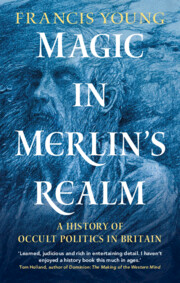Book contents
- Magic in Merlin’s Realm
- Reviews
- Frontispiece
- Magic in Merlin’s Realm
- Copyright page
- Dedication
- Contents
- Plates
- Preface
- Introduction
- 1 ‘Britain Indulges in Magic’
- 2 The Secrets of the King
- 3 Arthurian Dynasty
- 4 House of the Unicorn
- 5 Politics and the Decline of Magic, 1649–1714
- 6 Emanations of Albion
- Conclusion
- Bibliography
- Index
- Plate Section (PDF Only)
1 - ‘Britain Indulges in Magic’
The Origins of Occult Traditions in Britain
Published online by Cambridge University Press: 07 February 2022
- Magic in Merlin’s Realm
- Reviews
- Frontispiece
- Magic in Merlin’s Realm
- Copyright page
- Dedication
- Contents
- Plates
- Preface
- Introduction
- 1 ‘Britain Indulges in Magic’
- 2 The Secrets of the King
- 3 Arthurian Dynasty
- 4 House of the Unicorn
- 5 Politics and the Decline of Magic, 1649–1714
- 6 Emanations of Albion
- Conclusion
- Bibliography
- Index
- Plate Section (PDF Only)
Summary
Magic was not new to medieval Britain, but traditions of learned magic that reached Britain from the Islamic world in the twelfth century transformed perceptions of the political importance of magic. The figure of Merlin, confabulated by Geoffrey of Monmouth, represented an ideal royal counsellor with mastery of the occult arts. This chapter explores Britain’s reputation for magic from the Roman era onwards and introduces the various occult traditions introduced to Britain the Middle Ages, including the harnessing of occult properties through natural magic, the use of ritual magic to summon spirits, Kabbalism, alchemy, astrology, occult prophecy, and witchcraft. All of these occult traditions had the potential to play a role in politics, whether as threats to be feared by governments or as ‘supernatural technologies’ that were potentially attractive to rulers.
Information
- Type
- Chapter
- Information
- Magic in Merlin's RealmA History of Occult Politics in Britain, pp. 32 - 84Publisher: Cambridge University PressPrint publication year: 2022
